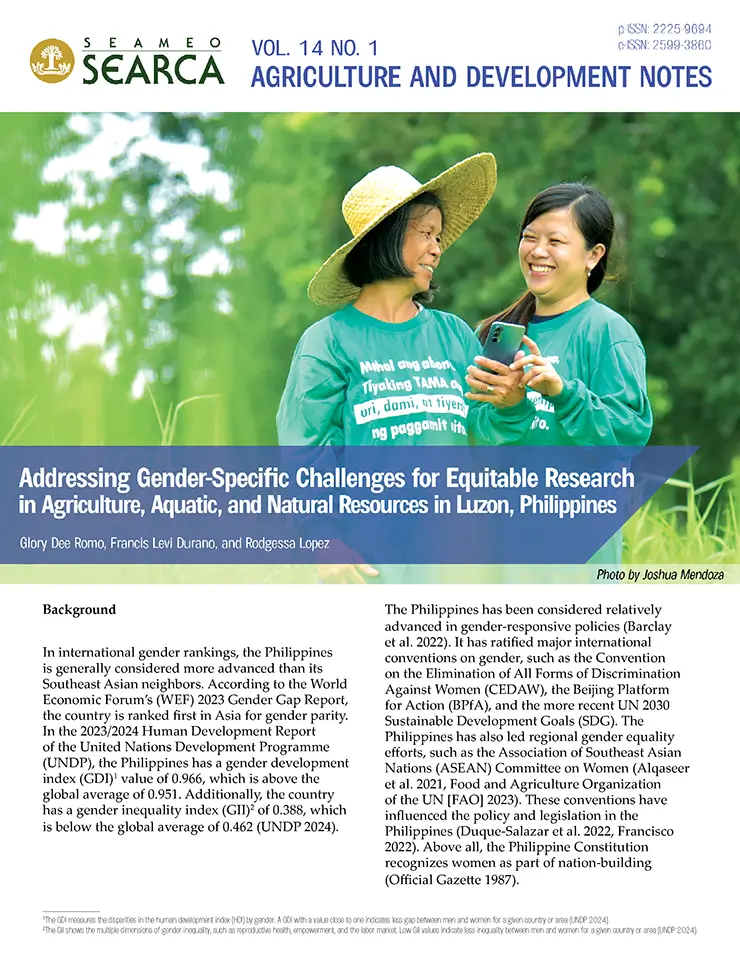LOS BAÑOS, Philippines—The Southeast Asian Regional Center for Graduate Study and Research in Agriculture (SEARCA) has released a new research note urging a systemic approach to embedding gender perspectives across the agriculture, aquatic, and natural resources (AANR) research landscape.
 The study is published in the issue of SEARCA's Agriculture and Development Notes series titled "Addressing Gender-Specific Challenges for Equitable Research in Agriculture, Aquatic, and Natural Resources in Luzon, Philippines." Authored by Glory Dee Romo, Francis Levi Durano, and Rodgessa Lopez of the School of Management at University of the Philippines Mindanao, the publication highlights persistent gender gaps in research practice despite the Philippines' strong policy environment for gender equality.
The study is published in the issue of SEARCA's Agriculture and Development Notes series titled "Addressing Gender-Specific Challenges for Equitable Research in Agriculture, Aquatic, and Natural Resources in Luzon, Philippines." Authored by Glory Dee Romo, Francis Levi Durano, and Rodgessa Lopez of the School of Management at University of the Philippines Mindanao, the publication highlights persistent gender gaps in research practice despite the Philippines' strong policy environment for gender equality.
The Philippines ranks first in Asia for gender parity because of institutional mechanisms like the Magna Carta of Women and the mandatory Gender and Development (GAD) budget, yet the study found that gender mainstreaming in AANR research remains uneven. Many respondents disclosed limited familiarity with gender research methodologies, difficulty implementing gender-responsive budgeting, and a lack of LGBTQIA+ perspectives during project design. Moreover, the study found that researchers often collect data broken down by gender but rarely apply them in their analysis and recommendations.
The publication underscores that addressing these barriers needs coordinated institutional action. It recommends closer collaboration between GAD and research offices, dedicated funding for gender-responsive research, and capacity building that equips all researchers—regardless of gender—with methodological and leadership skills.
Moreover, the study indicated that training programs must be flexible for women with caregiving responsibilities and include mentorship opportunities to strengthen early-career participation.
According to the authors, such systemic reforms are needed to create equitable research environments so that both women and men have equal access to funding, leadership roles, and professional development. This inclusivity is expected to broaden participation in research and richer diversity of insights and innovations that can guide agricultural programs and policies.
The study also cited the need to embed gender dimensions in research design to ensure that agricultural solutions align with the realities of farmers, fishers, and rural communities, and, down the line, promote fairer access to resources and livelihoods and build more inclusive food systems and adaptive institutions.
Moreover, the authors recommend policy changes for a fairer workload distribution and more equitable access to research opportunities for all researchers. They stress the need to intentionally include men and LGBTQIA+ researchers for a more balanced and dynamic research community.
This latest SEARCA publication underscores that gender-aware research is not only an equity issue—it is essential for agricultural research to be effective and relevant for all stakeholders. Its recommendations align with SEARCA's 12th Five-Year Development Plan, which advances Sustainable Transformation of Agricultural Systems through Innovation in Southeast Asia (SUSTAIN Southeast Asia), treating gender as a cross-cutting lens rather than a silo.